Workshops at our Summit
The workshops at Uppsala Health Summit provide opportunities for collaboration with fellow delegates from a diverse range of professional fields and roles in society. Together, you will develop suggestions that will contribute to the implementation of research and innovations for improving global health. Each session will be led by an expert on the topic and start off with a brief inspirational presentation.
Workshop Programme 24-25 October 2023
Tuesday 24 October
- A: Towards an intergovernmental panel on pollution and toxic waste
- B: Testing our way to a safe environment
- C: Health and environmental challenges of recycling chemicals in a sustainable management of plastics
- D: Future monitoring of chemical exposure and effects in humans, wildlife and the environment
- E: Conflicting objectives – using effective drugs without polluting our environment
Wednesday 25 October
This workshop will address chemical pollution and waste from a global perspective, and discuss how to proactively promote sustainability related to anthropogenic chemical use, their environmental and health hazards, risks, and management.
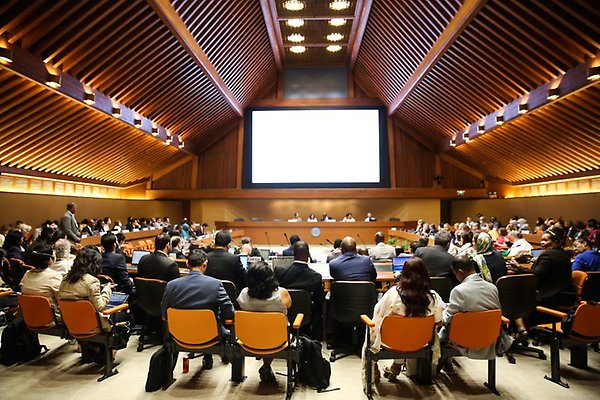
Photo: IISD/ENB Natalia Mros
In the workshop, we will draft recommendations supporting the development of an inter-governmental science-policy panel for sound management of chemicals and waste, currently under development by the United Nations Environment Programme (UNEP) following a resolution in the Environmental Assembly last year.
Why the workshop is needed:
Science is instrumental in the process of building awareness among policymakers, decision-makers, and the general public to act for the sustainable development of the environment and health free from hazardous chemical pollution. But according to UNEP, the chemical pollution situation is so serious that it is one among those in the triple crisis. A science-policy interface is required to address the chemical pollution threats with input from non-conflicted, highly competent scientists.
The Intergovernmental Panel on Climate Change (IPCC) and The Intergovernmental Science-Policy Platform on Biodiversity and Ecosystem Services (IPBES) - serve as established examples of how science and policy must interact. The objectives of these panels are to provide governments at all levels with scientific information for optimal decisions for a sustainable future. A panel on science policy addressing chemical pollution must build on existing global scientific data to support policy- and decision-makers with a base that is correct and firm for societal transformations related to chemical production and applications.
By bringing together researchers and policy practitioners with experience from existing intergovernmental panels and from the Stockholm Convention, the Minamata Convention, and others, we are hoping to support the development of a new panel on pollution and toxic waste, and also help establish academia as a strong partner in its implementation.
Inspirational speakers:
- Dr Martin Scheringer, Scientist, ETH Zürich
- Dr Kateřina Šebková, Director, RECETOX, Faculty of Sciene, Masaryk University
Workshop prepared by:
- Åke Bergman, Senior Professor, School of Science and Technology, Senior advisor in the management team of the Platform for Sustainable Future, Örebro University. Read the interview with Professor Åke Bergman
Chemicals used in commerce must be tested for safety. The testing strategy employed by the regulatory agencies worldwide can be very slow. The question is – how can we speed up testing at the same time we improve efficacy of the testing strategy?
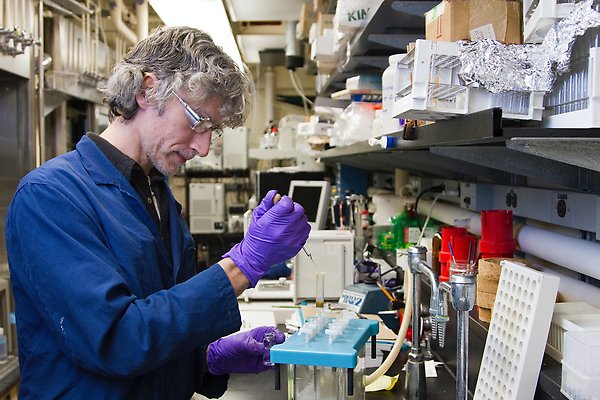
Photo: Chat GPT
Objectives:
The goal of this workshop is to bring together experts in the area of testing to identify ways that this process can be improved.
Why the workshop is needed:
To move toward a toxic-free society, several functional domains must be coordinated. Production of new materials must take safety into consideration from the beginning. New chemicals and products must be tested to confirm characteristics of safety, and this may require a change in the testing strategy to improve its efficacy and speed. Testing for biological activities including the ability to interfere with hormone systems. An important first step is to develop a thoughtful analysis of the current state and identify practical changes that could speed up the process and improve efficacy of the system.
Discussion:
The discussion will be framed by a presentation of the current situation. What is the level of chemical exposure to the human population globally? How are humans exposed and what are the health consequences? Then the discussion will turn to identifying the key elements of the global economy that need to make adjustments to begin the path toward safer testing and a more fair and sustainable economy.
Inspirational speakers:
- Anne Gourmelon, Principal Administrator, Organisation for Economic Cooperation and Development (OECD), France
- Dr Laura N. Vandenberg, Professor and Research Scientist, University of Massachusetts Amherst, USA
Workshop prepared by:
- R. Thomas Zoeller, Emeritus Professor, Department of Biology, University of Massachusetts Amherst; Visiting Professor, School of Science and Technology, Örebro University. Read the interview with Professor Thomas Zoeller
- Ida Hallberg, Lecturer, Researcher at Department of Clinical Sciences, Division of Reproduction, Swedish University of Agricultural Sciences (SLU)
Background:
In a circular economy, recycling of materials such as plastics need to increase dramatically. There are thousands of different plastics, containing different chemical additives such as plasticizers, stabilizers, biocides, flame-retardants, accelerators, colorants. A recent evaluation indicated that over 4000 chemicals were associated with plastic packaging materials. Of these, 68 rank high for environmental hazards, 63 rank high for human health hazards and 34 are endocrine disrupting chemicals. Plastic materials made from post-consumer plastics may therefore contain a complex mix of both intentional and unintentionally added chemicals. This is a goal conflict and constitutes a monumental challenge for sustainable management of plastics.
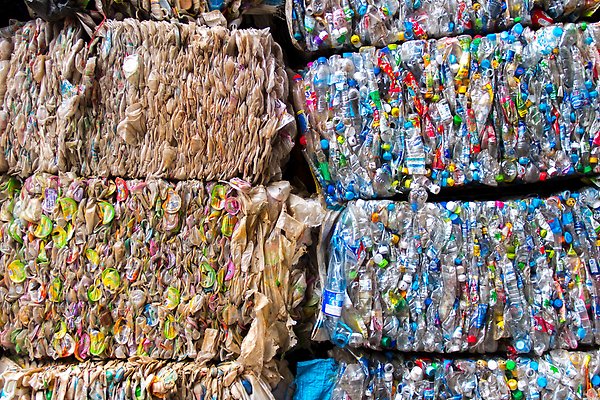
Photo: Getty Images
Aim:
The aim of the workshop is to contribute to the roadmap for future management of plastics and post-consumer recycling of plastics, from a human and environment health perspective.
Desired outcome:
This workshop will address chemicals related to plastics and recycled plastics by collecting the knowledge on human and environmental effects of plastic related chemicals, and present and discuss the methodologies that can be used to assess plastics, related chemicals, and human and environmental effects. Finally, recommendations and future directives towards restrictions and initiatives to reduce hazardous chemicals in plastics and recycled plastics will be made.
Workshop topics:
- Inventory of chemicals related to plastics, knowledge on use, human- and environmental effects
- Emissions and exposure during the recycling process, impacts on regional scales
- Recycled plastics vs virgin plastics, are recycling a way to eliminate or accumulate hazardous chemicals?
- Which chemicals need to be removed from plastics to enable a sustainable management and protect humans and the environment?
Inspirational speakers:
- Dr Jane Muncke, Scientist, Food packaging forum foundation, Zürich
Workshop prepared by:
- Anna Kärrman, Senior Lecturer, School of Science and Technology; Associate Professor in Environmental Chemistry, Man-Technology-Environment Research Centre, Örebro University
- Magnus Engwall, Professor, School of Science and Technology; Research Director of Man-Technology-Environment Research Centre, Örebro University
Historically, monitoring and research on exposure and effects of chemicals in the environment has had a strong focus on wildlife. Focus has then shifted more towards research on humans. Considering the increasing complexity of the mixture of chemicals being released into the environment it is becoming increasingly challenging to unravel the effects on both wildlife and humans.
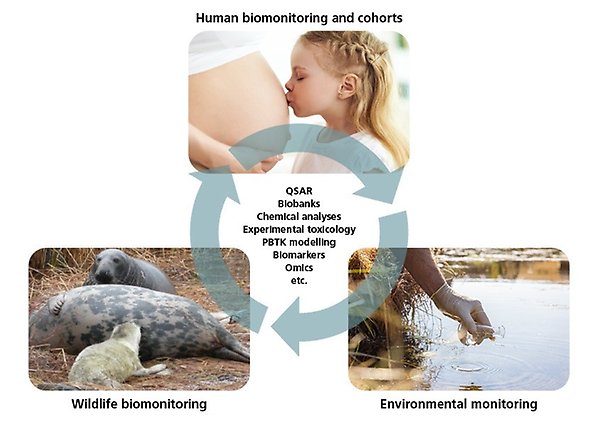
Photo: Anna Roos; selma project; Getty images
However, there are many common ecological, physiological, and biological processes to build upon. With a One Health approach, a more integrated monitoring of the environment, wildlife and humans could advance our understanding on chemical exposures and effects. This can lead to faster and more purposeful exchange of knowledge between different disciplines and professions, which in turn can help drive legislation more quickly.
Identifying key factors such as types of samples, biomarkers, end-points, indicators and thresholds as well as methods is an important first step. Further, in both environmental and human monitoring, efforts are made to safe-keep tissues in biobanks for the use in future analysis. Sampling schemes and choice of preservation methods will be important for facilitating and increasing the use of tissues for monitoring in the future. These efforts have to be harmonized with needs for future legislation of chemicals.
In this workshop, we will discuss:
- What are the most pressing challenges within environmental and human monitoring today and in the future? Can we be more proactive than reactive?
- How do we create monitoring and research frameworks for wildlife and human exposure that will ensure that we can track and respond to emerging chemicals?
- What methods should we use to bridge the gap between our understanding of exposure and effects in humans compared to wildlife and the environment?
- How can research help improving environmental and human monitoring from a One Health perspective and can how can researchers make use of the collections and data generated within monitoring?
The workshop invites stakeholders and actors from universities, research institutes and the private and public sectors with an interest in environmental research and monitoring to come together to discuss, share knowledge and find solutions.
Inspirational speakers:
- Dr Pete Myers, Ph.D. Chief Scientist of Environmental Health Sciences, Adjunct Professor of Chemistry at Carnegie Mellon University
Workshop prepared by:
- Sara Persson, Department of Clinical Sciences, Division of Reproduction, Swedish University of Agricultural Sciences (SLU)
- Carl-Gustaf Bornehag, Professor and Head of Public Health Sciences, Department of Health, Karlstad University, Sweden; Adjunct Professor at Icahn School of Medicine at Mount Sinai, New York, USA
- Anne Soerensen, Project Coordinator for the Swedish Programme for Contaminants in Marina Biota, Natural History Museum
The objective of this workshop is to discuss overarching policy recommendations and strategies for risk mitigation.

Photo: iStockPhoto
The use of pharmaceuticals to restore and maintain health in humans and animals is a fundamental part of today’s society. However, unintended exposure to pharmaceuticals has in the last decades been increasingly connected to harmful effects in the environment. End-of-pipe solutions such as sewage treatment are necessary, but we will also need other actions. Actions, that in a more long-term perspective, and perhaps also with less costs, may prevent and reduce the problem with pharmaceutical pollution. Can initial substantial investments in short term solutions gradually be decreased and funds reallocated towards mid- and long-term solutions? With whom lies the responsibilities for addressing pharmaceutical pollution? At present there are many known measures and policy actions in different parts of the lifecycle of pharmaceuticals. However, the overarching strategic approach considering timing is not in place. What are the pressures needed from policy to do this and how do we secure the protection of the environment without jeopardizing access to safe and effective drugs, affordable also for the less wealthy parts of the world?
This workshop invites stakeholders and actors from the private, public and non-profit sectors to jointly discuss and work towards a strategy for safeguarding the environment while maintaining access to safe and effective treatments for humans and animals. We especially encourage participation from Health and Environmental ministries, Environmental protection agencies, Pharmaceutical industry, Health care providers, Academia and NGOs dealing with Pharmaceuticals in the Environment.
Inspirational speakers:
- Dr Jerker Fick, Associate Professor, Umeå University
Workshop prepared by:
- Krister Halldin, Assessor, Swedish Medical Products Agency. Read the interview with Krister Halldin
- Cecilia Berg, Assessor, Swedish Medical Products Agency
- Elize Leto, Development Manager, Region Uppsala
What the workshop is about:
Due to their benefits to modern society and daily life, the number and quantity of chemicals have continued to increase over the past few decades.During their life cycle, these chemicals can reach the environment, including water systems that are sources of drinking water production and/or for bathing, recreational purposes. The resulting pollution with so-called contaminants of emerging concern (CECs) is an important health issue, since their fate and behaviour in the environment as well as their potentially harmful effects on humans, animals and the environment remain not fully understood. Some CECs give rise to important health issues, such as, antimicrobial chemicals that raise matters on antimicrobial resistance, and PFAS that are present in drinking water due to inefficient removal with existing water treatments.
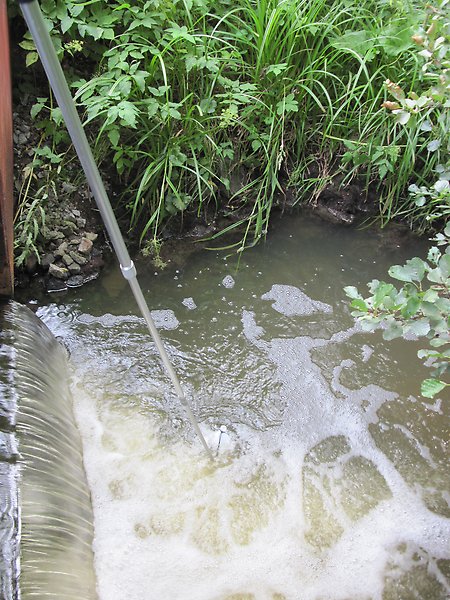
Aim of the workshop:
The workshop aims to increase awareness of the impacts of CECs on various societal sectors as well as the need for developing new and existing methods and tools for identification, treatment, and risk evaluation of the contaminants in water. As such the workshop will serve as a platform for facilitating discussion and communication between policymakers, industry representatives, politicians, and researchers concerned with water quality issues related to CECs,.
This workshop will discuss:
The importance of protecting water quality from CECs in One Health. This serves as a starting point to elaborate the future need in consolidating CEC knowledge, improving assessment methods and tools, developing more efficient or new treatment techniques, and encouraging the implementation of new monitoring schemes and new strategies for policy and legislation in managing risks of CECs from source to tap. By taking PFAS as a classic example of regulations in water quality being increasingly strict, antimicrobials and other CECs may be equally deserved similar attention. Discussion would be of interest on the responsibility for better addressing and managing the presence and risks of CECs in water and in water for reuse.
Inspirational speakers:
- Hans Peter H. Arp, Professor at the Norwegian University of Science and Technology (NTNU) and Expert Advisor at the Norwegian Geotechnical Institute (NGI)
- Dr Elin Lavonen, Water specialist at BioCell Analytica, Professor at Aalto Univeristy
Workshop prepared by:
- Karin Wiberg, Professor, Department of Aquatic Sciences and Assessment, Section for Organic Environmental Chemistry and Ecotoxicology, Swedish University of Agricultural Sciences (SLU)
- Lutz Ahrens, Professor in Environmental Organic Chemistry, Department of Aquatic Sciences and Assessment, Division of Environmental Organic Chemistry and Ecotoxicology, Swedish University of Agricultural Sciences (SLU)
- Foon Yin Lai, Associate Professor in Environmental Chemistry, Department of Aquatic Sciences and Assessment, Division of Environmental Organic Chemistry and Ecotoxicology, Swedish University of Agricultural Sciences (SLU)
Chemical and plastic pollution has costly and devastating impacts on human health and biological diversity. Although the levels of some hazardous substances have decreased due to laws and policies limiting their use, the gap between the existing situation and internationally agreed upon goals is immense, despite an impressive growth of knowledge in recent years. The main reason for lack of progress is policy failure, not least on the international level.
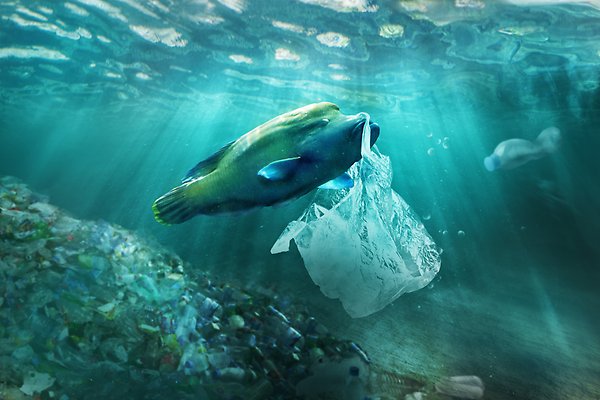
Photo: Getty Images
About the workshop:
This workshop takes on that challenge and explores various options to improve global chemicals governance, with a focus on public policy and international law. Against the background of experiences with the present Basel, Rotterdam, Stockholm and Minamata conventions, and the SAICM, the workshop will first discuss on the emerging global plastic treaty, which the UN Environmental Assembly has resolved to put forward by the end of 2024. What objectives, principles, obligations and institutional and processual components are required for controlling plastic-generated pollution?
Considering the limited scope of the present and emerging treaties in relation to UN and other targets related to achieving a non-toxic environment, the workshop will further elaborate on the prospects of eventually developing a global framework regime for hazardous substances. How would such an instrument ideally be constructed in order to truly control the universe of chemicals, considering human health and biodiversity?
The outcome of the first and second part of the workshop will be formulated in terms of a series of recommendations to policy-makers and other stakeholders. A key input to the dialogue will be the workshop on a science-policy panel on the first day of the summit.
Inspirational speakers:
- Mr Vito A. Buosante, Law and policy advisor, International Pollutants Elimination Network (IPEN), Brussels
- Luis Vayas, Ambassador, Ecuador, Vice President of the INC Bureau of the global legally binding instrument on plastic pollution
Workshop prepared by:
- Mikael Karlsson, Senior Lecturer/Associate Professor, Natural Resources and Sustainable Development, Climate Change Leadership, Department of Earth Sciences, Uppsala University
- Yaffa Epstein, Associate Professor, Department of Law, Uppsala University and Research Fellow, Swedish Collegium for Advanced Study
This workshop will explore emerging health risks in the feed food chain, with a specific focus on risk analysis and effective communication between risk assessors, risk managers, and the public.

Photo: iStock Photo
An emerging health risk in this context is a chemical that is brought to attention either by health effects in animals or humans, such as for instance acrylamide, or by its detection in the environment, such as PFAS (per- and polyfluoroalkyl substances). During the workshop we will discuss strategies for effective preparation and management of future emerging risks in the feed food chain using the lessons learned from historical events.
Goal of the workshop:
- Foster a proactive mindset among risk assessors and managers, to effectively manage complex health threats in the feed and food chain.
- Exchange experiences from different parts of the world and identify areas where research and further knowledge is needed.
- Facilitate networking and collaboration between individuals and organizations with diverse roles and expertise in the feed and food chain.
Examples of aspects to discuss include:
- With a global perspective, how can we balance conflicting goals in the feed-food chain, such as protecting consumers from health hazards while minimizing the impact on the food industry and avoiding food shortages?
- How can a risk assessor support the risk manager in situations when information is uncertain?
- How and what should be communicated to the public and other stakeholders in situations where outcomes are uncertain?
- In a crisis, how do we determine what level of safety is "safe enough" for consumers? What does “zero tolerance” mean and how could we manage the discovery of trace levels of contaminants?
Inspirational speakers:
- Mr Rob Theelen, Food safety expert, Dutch Ministry of Agriculture, Netherlands (retired)
Workshop prepared by:
- Johanna Dernfalk, Head of Section, Swedish Veterinary Agency, SVA
- Gunnar Andersson, Researcher, PhD, Swedish Veterinary Agency, SVA. Read the interview with Dr Gunnar Andersson
Metabolic diseases have increased in the past few decades across age segments, in both genders, and in both developing and developed countries. Exposure to environmental toxicants is now widely accepted as a factor contributing to this increasing incidence of metabolic diseases, within the realm of the Development of Origins of Health and Disease (DOHaD). Such environmental compounds are known as ‘obesogens’.

Photo: iStock Photo
Many of these compounds involve endocrine disrupting chemicals, which mimic the action of our hormones in our receptors. These compounds are the main components of many daily life products such as plastics, electronics, pesticides and agrochemicals. Residues of endocrine disruptor can persist in the environment for many years, and bioaccumulate in organisms, having detrimental for ecosystems in general and for human health in particular. Additionally, bioaccumulation of many of these toxicants is known to occur in organisms used to feed human populations, such as fish, sea shells and vegetables. Despite this evidence, much of the public policies in relation to metabolic disease around the world is made based solely on the genetic, nutritional, and physical activity aspects. These aspects certainly have a fundamental role for the understanding of metabolic diseases. However, a complete picture on the causes of metabolic diseases requires the incorporation of the environmental exposure aspect. This knowledge can have profound implications in the elaboration of new and effective public policies to tackle the increasing global incidence of metabolic diseases. In order for this to occur, however, it is of utmost importance to establish clear connections between exposure to contaminants and metabolic diseases in human populations.
In this workshop we will gather experts from different backgrounds to promote an evidence-based discussion on the role of exposures to contaminants on the incidence of metabolic diseases in humans. This will be coupled with the identification of gaps in public policies, and suggestions for improvements.
Inspirational speakers:
- Bárbara Enchiburú, Professor and Researcher, University of Chile
- Prof. Juliette Legler, Professor, Utrecht University, Netherlands
Workshop prepared by:
- Carlos Guerrero Bosagna, Senior Lecturer/Associate Professor at Department of Organismal Biology, Environmental Toxicology, Uppsala University. Read the interview with Carlos Guerrero Bosagna
- Peter Bergsten, Professor, Department of Medical Cell Biology (MCB), Uppsala University
